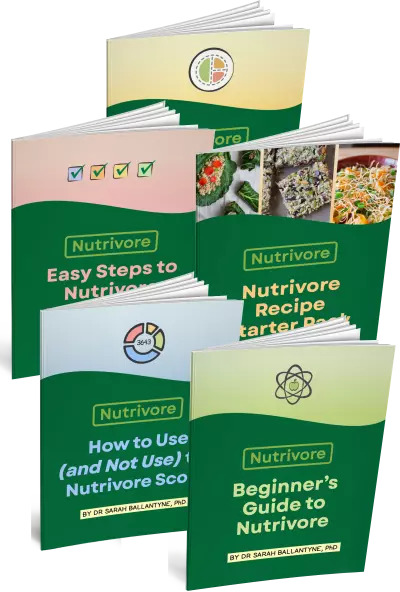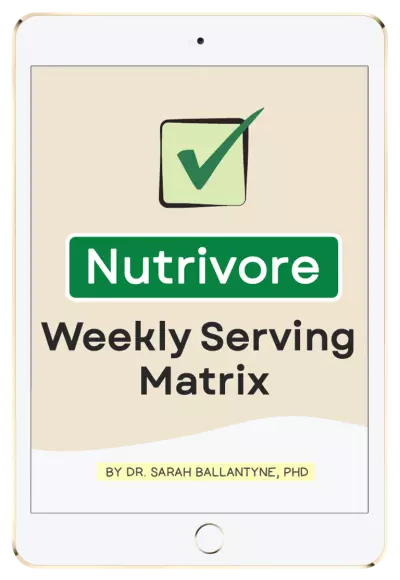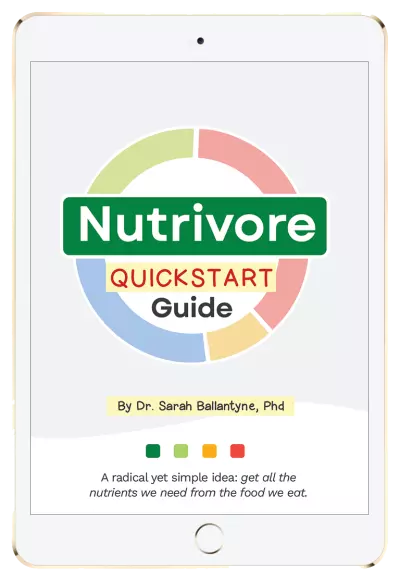Key Takeaways (expand)
- Nutrivore centers on nutrient sufficiency: The primary goal is meeting all of our nutritional needs from food without unnecessary restrictions, focusing on nutrient density rather than labeling foods as “good” or “bad.”
- Flexible and adaptable: Nutrivore serves as a diet modifier that can be applied to any dietary framework, emphasizing nutrient-rich choices without requiring major changes.
- Tools for easy implementation: Nutrivore tools like the Nutrivore Score, Meal Map, and Weekly Serving Matrix simplify nutrient-dense eating, helping guide choices without needing meticulous tracking.
- Encourages a positive relationship with food: By emphasizing what we can add rather than eliminate, Nutrivore fosters a healthier, more inclusive attitude toward food and promotes balanced, satisfying dietary habits.
- Allows room for quality-of-life foods: Nutrivore embraces flexibility, recognizing the value of including favorite treats and indulgences within an overall nutrient-focused diet.
Table of Contents[Hide][Show]
Learn how to eat, not how to diet. Nutrivore is a fresh approach to food that prioritizes getting all the essential nutrients we need from the foods we eat—without strict rules or cutting out the foods you love. At its core, Nutrivore is about adding nutrient-dense foods that support health and reduce the risk of chronic diseases while embracing food for enjoyment, traditions, and convenience. This simple focus on nourishment, rather than restriction, encourages a healthy diet rich in variety that can be adapted to any preferences or lifestyle.
Nutrivore redefines what it means to eat well, moving away from typical diet culture that emphasizes weight loss and rigid rules. Instead, the goal is sustainable nutrition, i.e., lifelong healthy eating patterns without the on-again-off-again diet roller coaster. This positive, flexible approach makes it easy to build a diet that’s satisfying, sustainable, and tailored to your unique needs—helping you improve overall diet quality while fostering a balanced, enjoyable relationship with food.
The Nutrivore Philosophy
Nutrivore is not a diet, but rather a dietary philosophy grounded in one core principle: Meeting our nutritional needs through food. At its heart, Nutrivore is about selecting foods that together supply the body with all the essential nutrients needed to thrive. Rather than prescribing strict food rules or limiting entire food groups, Nutrivore embraces a more holistic approach to diet quality.
The main goal of Nutrivore is to create a nutrient-sufficient diet, one that supplies enough of each essential nutrient to support optimal health. Nutrient sufficiency is key to preventing the risks of nutrient deficiency and insufficiency, which can contribute to chronic health issues. Nutrivore is focused on choosing foods that maximize nutrient intake relative to caloric intake, promoting a diet that helps meet or exceed the daily recommended intake of essential vitamins, minerals, proteins, fiber, healthy fats, and beneficial plant compounds.
Nutrivore emphasizes the importance of looking at diet quality as a whole rather than assigning value to individual foods. There’s no such thing as a nutritionally “perfect” food or food group that alone can supply every essential nutrient. This is why Nutrivore values the whole diet—it’s about combining foods that complement one another nutritionally, creating a balanced diet that provides all necessary nutrients over time, rather than seeking perfection in every single meal. This whole-diet approach also means that Nutrivore doesn’t aim for nutrient sufficiency every day but encourages us to meet nutrient needs on average, across a few days or even a week.
Because it’s a dietary philosophy rather than a rigid diet, Nutrivore is incredibly flexible. It can be implemented as an anti-diet, but it can also enhance any dietary framework, from Paleo to Mediterranean to plant-based diets. By utilizing Nutrivore as a “diet modifier”, you can learn how to incorporate more nutrient-dense foods into your chosen eating style, whatever that may be. This flexibility means you can tailor Nutrivore to your specific needs, preferences, and lifestyle while reaping its health benefits.
One of the most unique aspects of Nutrivore is its inclusive, positive stance toward food. Nutrivore encourages an open-minded perspective on foods, avoiding the labeling of certain foods as “good” or “bad.” Instead of judging ourselves based on food choices, Nutrivore emphasizes nourishment over restriction, which can prevent the cycle of guilt, stress, and “yo-yo” dieting often seen with restrictive diets. By focusing on the whole diet rather than isolated food choices, Nutrivore helps us make balanced, health-supporting decisions without the psychological burdens of traditional diet culture.
Nutrivore Is a Game-Changer—These 5 Free Guides Show You Why
Sign up for the free weekly Nutrivore Newsletter and get 5 high-value downloads—delivered straight to your inbox—that make healthy eating simple and sustainable.

Why Is Nutrivore Important for Health?
Nearly everyone is falling short of meeting their nutritional needs. For 4 essential nutrients, 90% or more of Americans fail to get the daily value from the foods they eat. For 10 essential nutrients, half or more of Americans fall short of meeting their nutritional needs. (For more, see The Prevalence of Nutrient Deficiencies and Insufficiencies.) And this increases the risk of just about everything that can go wrong with us healthwise.
Nutrient sufficiency—consistently meeting or safely exceeding the body’s requirements for essential and nonessential nutrients—forms the backbone of the Nutrivore philosophy. This approach emphasizes a nutrient-complete diet, which not only reduces the risk of deficiencies but also supports the overall functioning of biological systems. Nutrient insufficiencies, even when mild, have a cumulative effect that increases the risk of chronic disease over time. Here’s why nutrient sufficiency is critical for long-term health.
When we don’t get enough of the vitamins and minerals essential to health, our biological systems lack the resources they need to function optimally. Nutrient deficiencies, such as vitamin C deficiency leading to scurvy or vitamin B12 deficiency causing neurological impairment, show us the clear link between nutrition and specific diseases. However, the impact of nutrient insufficiencies on disease risk is often more gradual and less direct than diseases of malnutrition.
With a collection of nutrient insufficiencies, biological systems become strained, leading to an increased risk for chronic diseases over time. For example, calcium plays a role not only in bone density but also in muscle contraction and nerve transmission. Low calcium intake has far-reaching implications, increasing risk of osteoporosis, hip fractures, kidney stones, preeclampsia, and preterm birth, high blood pressure, colorectal cancer, cervical cancer, kidney cancer, obesity, diabetic retinopathy, sarcopenia, and increased symptoms of PMS!
Shortfalls in important nutrients may not cause immediate symptoms but will gradually weaken the body’s defenses, ultimately increasing susceptibility to related diseases, with every nutrient having multiple disease connections, and every chronic disease having multiple connections to vitamins, minerals, amino acids, fatty acids, and phytonutrients.
Reducing the Risk of Chronic Disease
Chronic diseases most typically arise from a combination of factors, with nutrient insufficiencies interacting with lifestyle, genetics, social determinants of health and environmental influences. A lack of specific nutrients can stress and weaken biological systems, which interact with lifestyle factors like sleep habits, stress levels, and physical activity and health-related behaviors like whether or not you smoke or drink alcohol. This means nutrient insufficiencies often don’t act alone; they are part of a complex web of factors that contribute to disease. For instance, approximately two dozen nutrients play protective roles in cardiovascular health, supporting blood vessel integrity and heart muscle function, but they also depend on factors such as physical activity and stress levels to fully optimize heart health and reduce risk of cardiovascular disease. This further emphasizes the value of a food-based approach to getting the nutrients our bodies need—it’s the most efficient, effective and affordable way to cover all of your nutritional bases.
Although the causes of chronic conditions are complex, nutrition offers a clear and accessible point of intervention. Studies show that diets rich in nutrient-dense foods consistently lower the risk of chronic diseases such as type 2 diabetes, cardiovascular disease, cancer, obesity, Alzheimer’s disease and other neurodegenerative diseases, osteoporosis, osteoarthritis, chronic kidney disease, thyroid disease, diverticular disease, autoimmune disease, asthma, allergies, chronic fatigue, headaches, and more.
Meeting nutrient needs doesn’t just lower disease risk; it also promotes day-to-day well-being. Optimal nutrient intake improves energy levels, mood, cognitive function, and sleep quality, providing the foundation for a vibrant, fulfilling life. For example, magnesium, zinc, iron, vitamin E, vitamin B6, glycine and tryptophan can all improve sleep quality.
By ensuring nutrient sufficiency, Nutrivore empowers individuals to feel their best both physically and mentally.
Developing Nutrient Awareness
A central part of the Nutrivore approach is developing a greater awareness of the important nutrients that fuel our bodies and understanding which foods supply them. Nutrient awareness empowers us to make informed food choices that contribute to overall health and balance in a way that’s flexible, enjoyable, and achievable.
Nutrients are the building blocks of health, supporting every function in the body from immune response to brain function, muscle repair, and cellular energy. Without enough of each essential nutrient, the body can’t function optimally, leading to shortfalls that may increase the risk of chronic health conditions, low energy, and decreased quality of life. Nutrivore encourages us to think about food in terms of the nutrients it provides rather than rigid rules or restrictions. By cultivating an understanding of how different nutrients support our health, Nutrivore helps us appreciate the unique contributions each food brings to our diet.
Nutrivore takes a more granular approach to categorizing foods, rather than the four or five food groups that you’re used to, or the even more simplistic plant foods versus animal foods debate on social media. Instead, Nutrivore categorizes by food family, groupings of highly-related foods that provide a predictable collection of nutrients that support the body in different ways. By understanding the types of nutrients each group offers, you can more easily build a diet that’s naturally balanced and nutrient-dense. Here’s an overview of five more important foods to add—Nutrivore foundational foods—and the nutrients they bring to the table:
- Vegetables: Vegetables are some of the most nutrient-dense foods available, especially leafy greens, cruciferous vegetables, root vegetables, mushrooms and alliums (the onion family). They’re rich in fiber, which supports digestive health, as well as vitamins A, C, and K, which are essential for immune function, skin health, and bone strength. Vegetables also provide a wide range of minerals like potassium and magnesium, which help regulate muscle function and blood pressure.
- Fruits: Fruits are packed with antioxidants, polyphenols, and vitamins, particularly vitamins C and E, which help protect cells from oxidative stress and inflammation. Many fruits are also rich in fiber and water, making them both hydrating and beneficial for digestion. Certain fruits, like berries and citrus, offer especially high levels of these protective compounds and nutrients, while others, like bananas, add potassium, which is important for heart health.
- Seafood: Seafood, including fish and shellfish, is a standout source of omega-3 fatty acids, crucial for brain and heart health, and also supplies hard-to-get nutrients like iodine, selenium, and zinc. Fatty fish, such as salmon and sardines, are especially nutrient-dense and provide a rich source of vitamins D and B12, supporting immune health and energy production. Seafood’s unique nutrient profile makes it an excellent addition to a balanced diet.
- Legumes: Legumes, including beans, lentils, and chickpeas, are high in fiber, slow-burning carbohydrates, and plant-based protein, which promote satiety and support digestive health. They’re also rich in minerals like magnesium, iron, and zinc, which play a role in everything from energy production to immune function. Legumes are also an affordable and versatile source of folate, an essential B vitamin that supports cell function and development.
- Nuts and Seeds: Nuts and seeds provide healthy fats, particularly monounsaturated and polyunsaturated fats, which benefit heart health and reduce inflammation. They’re also packed with minerals like magnesium and copper, which support bone health and metabolism, and offer vitamin E, a powerful antioxidant. Nuts and seeds contain fiber and a variety of phytonutrients, making them a nutrient-dense choice that adds flavor, texture, and nutrition to meals.
By regularly including foods from each of these groups, you’ll be nourishing your body with a full spectrum of essential nutrients, including both micronutrients and macronutrients, naturally supporting better health and resilience. By finding ways to add these foods that fits your budget and preferences, you create a balanced, nutrient-rich diet that meets the body’s needs without eliminating any one category or creating gaps in your nutritional intake.
Because no single food or food group can provide all essential nutrients, Nutrivore emphasizes combining foods that complement one another. For instance, pairing leafy greens with root vegetables and lean proteins or seafood can create a balanced meal that offers essential vitamins, minerals, protein, and fiber in a single dish. This approach also means that even foods that may not be incredibly nutrient-dense on their own (such as a side of white rice or a slice of bread) can play an important role when paired with nutrient-rich options (like serving rice with a nutrient-dense stir-fry, or making a sandwich).
Over time, nutrient sufficiency comes from a varied diet that includes nutrient-dense options across multiple food groups. This combined approach is what makes Nutrivore so effective for sustaining overall health.
A great benefit of Nutrivore is that you don’t need an extensive understanding of nutritional science to successfully implement it in your life. Nutrivore provides accessible tools like the Nutrivore Score and the Nutrivore Weekly Serving Matrix that make nutrient-dense eating straightforward, even for those new to nutrition. The Nutrivore Score offers a simple number that reflects a food’s nutrient density (nutrients per calorie), guiding you to make the most nutrient-rich choices within each category. The Nutrivore Weekly Serving Matrix, on the other hand, highlights weekly targets for nutritionally distinct foods, giving you a clear framework for building a nutrient-complete diet without meticulous tracking.
These tools are designed to take the guesswork out of nutrient awareness, helping you focus on enjoying food and creating balanced meals. By following the healthy eating patterns identified through the Nutrivore philosophy, you can nourish your body fully, regardless of your level of expertise.
Nutrients
Understanding nutrients is at the heart of the Nutrivore approach, helping you make empowered, nourishing food choices. Nutrients fuel every function in our bodies, from boosting energy to supporting immune health and cognitive function. By learning about the role nutrients play in our well-being and discovering which foods are richest in essential vitamins, minerals, and other beneficial compounds, you can unlock a deeper level of nourishment in your everyday meals. Nutrient awareness opens up a world of vibrant, nutrient-rich foods that each bring something unique to the table—allowing you to build a balanced, Nutrivore-inspired diet that fully supports your health while still enjoying the foods you love. Dive in and discover how to make nutrient-dense choices that work for you, one meal at a time.
The Tools of Nutrient-Dense Eating
The Nutrivore philosophy includes practical tools designed to make nutrient-dense eating both accessible and easy to implement. These tools help guide choices without requiring meticulous tracking, encouraging variety while supporting nutrient sufficiency. Here’s an overview of the key tools Nutrivore offers:
The Nutrivore Score
The Nutrivore Score is a powerful, simple tool that measures the total nutrients per calorie in a food. By calculating a food’s nutrient density, the Nutrivore Score provides a straightforward way to identify the most nutrient-rich foods within any category. Foods with higher Nutrivore Scores deliver more nutrients per calorie, making it easier to choose options that contribute most significantly to overall health.
The Nutrivore Score helps you make informed decisions, whether you’re at the grocery store or planning meals at home, and encourages exploring new foods that can bring nutrient diversity to your diet.
The Nutrivore Score
The Nutrivore Score is a comprehensive tool for assessing nutrient density, helping you make nutrient-rich choices by highlighting the amount of essential nutrients per calorie in foods. The Nutrivore Score supports balanced eating by encouraging comparisons within food groups, practical swaps, and easy nutrient-boosting additions. With a flexible approach that avoids moralizing food, the Nutrivore Score and related resources empower individuals to enhance their diet quality, improve nutrient intake, and support long-term health, all while embracing variety and enjoyment.
The Nutrivore Meal Map
The Nutrivore Meal Map is a guide that simplifies meal planning by providing a structure for creating balanced, nutrient-dense meals. The Meal Map includes suggestions for each meal component—such as vegetables, protein, healthy fats, and nutrient-rich side dishes—making it easy to construct meals that are varied, satisfying, and packed with essential nutrients. With the Meal Map, you don’t have to count or measure precisely; instead, it offers flexibility within a framework that supports nutrient density.
You can get a free download of the Nutrivore Meal Map when you sign up for the free, weekly Nutrivore Newsletter here.
Nutrivore Foundational Foods
Nutrivore Foundational Foods are nutrient powerhouses—foods so rich in essential nutrients that they can significantly improve long-term health when consumed regularly. These foods form the core of a nutrient-sufficient diet, helping us achieve the Nutrivore goal of meeting our bodies’ nutritional needs efficiently, while leaving plenty of room for quality-of-life foods. The Nutrivore Foundational Foods include vegetables (with emphasis on cruciferous vegetables, alliums, mushrooms, leafy greens, and root vegetables), fruits (with emphasis on citrus fruits and berries), nuts and seeds, pulse legumes, and seafood. Each of these food families provides a unique combination of essential nutrients, with scientific evidence linking them to extensive health benefits. By incorporating a variety of these foundational foods into our meals, we can easily build a diet that covers a full spectrum of nutrients, supporting overall health and well-being.
Importantly, just as Nutrivore doesn’t restrict any foods, it also doesn’t require any specific foods. While Nutrivore Foundational Foods are particularly nutrient-dense and can efficiently help you reach your nutrition goals, they aren’t the only way to get there. Nutrivore encourages flexibility and recognizes that there are countless ways to combine and enjoy foods that provide all the nutrients your body needs. You can build a nutrient-sufficient diet around foods that suit your tastes, lifestyle, and preferences. With Nutrivore, it’s about finding a variety of nutrient-rich options that work best for you, creating a diet that supports health without rigid rules or must-eat lists.
You can learn more about Nutrivore Foundational Foods below or get the definitive e-book here.
Foundational Foods
Nutrivore Foundational Foods are the nutrient powerhouses that form the backbone of a nourishing, balanced diet. These foods—like leafy greens, berries, seafood, legumes, and nuts—are packed with vitamins, minerals, fiber, healthy fats, and phytonutrients that support long-term health and vitality. By incorporating a variety of these foods regularly, and following the flexible serving targets outlined here, you can more easily meet your body’s nutritional needs while enjoying delicious, satisfying meals. Nutrivore Foundational Foods make it simple to focus on what to add to your plate, allowing plenty of room for enjoyment and flexibility in your diet. Discover the foods that can transform your approach to eating and support optimal wellness every day.
The Nutrivore Weekly Serving Matrix
To encourage balance and variety, the Nutrivore Weekly Serving Matrix outlines weekly serving targets for distinct food families identified as foundational in the Nutrivore approach. This matrix serves as a flexible checklist to ensure you’re incorporating a range of foods each week, from vegetables and fruits to legumes, seafood, nuts, and seeds. By following the Weekly Serving Matrix, you can feel confident that your diet includes a diversity of nutrient sources without needing to track every nutrient individually. This tool empowers you to build a diet rich in essential nutrients without sacrificing simplicity or enjoyment.
You can find the Nutrivore Weekly Serving Matrix in the book or here.
Together, these tools offer a practical approach to eating well without overthinking, making Nutrivore easy to adapt to any dietary preference or lifestyle.
Easily track your servings of Nutrivore Foundational Foods!

The Nutrivore Weekly Serving Matrix
The Nutrivore Weekly Serving Matrix digital resource is an easy-to-use and flexible weekly checklist designed to help you maximize nutrient-density and meet serving suggestions of Nutrivore foundational foods, all without having to weigh or measure your foods!
Includes a 22-page instructional guide and downloadable interactive guides.
Buy now for instant digital access.
What a Nutrivore Diet Looks Like
A Nutrivore diet is both nourishing and enjoyable, built on a foundation of diverse, nutrient-dense whole foods that naturally fulfill the body’s nutritional needs. Here’s a snapshot of the key components and flexibility of a Nutrivore-inspired eating plan:
The Nutrivore diet emphasizes a broad range of foods, each offering unique nutrients that contribute to overall health. While there’s room for flexibility, the foundation of a Nutrivore diet generally includes those foods with the highest nutritional value:
- Vegetables: Leafy greens, cruciferous vegetables, root vegetables, mushrooms, alliums, and colorful varieties.
- Fruits: Berries, citrus fruits, melons, tropical fruits, and seasonal favorites.
- Seafood: Fish and shellfish.
- Legumes: Beans, lentils, chickpeas, and peas.
- Nuts and Seeds: Almonds, walnuts, peanuts, chia seeds, and flaxseeds.
These nutrient-dense foods make up the core of a Nutrivore diet, but Nutrivore is flexible enough to include other food groups and types as well.
Real-Life Examples
Nutrivore isn’t about perfection in every meal or every day. Instead, it encourages us to view nutrient sufficiency across the week, allowing for variety and flexibility. One day might focus more on fiber-rich vegetables and fruits, while another might emphasize protein and healthy fats from seafood, nuts, and seeds. This balanced approach allows you to enjoy a variety of foods without feeling restricted, knowing that the goal is to meet nutrient needs on average.
Need some real-life examples? A day in the life of a Nutrivore diet might look like this:
- Breakfast: Greek yogurt topped with fresh berries, a sprinkle of granola, and some added chia seeds and walnuts.
- Lunch: Mixed greens with roasted veggies, grilled chicken, chickpeas, avocado, and your favorite salad dressing, served with a side of whole-grain pita.
- Snack: An apple with your favorite nut butter, or hummus with carrot sticks and sliced bell peppers.
- Dinner: Grilled salmon with roasted sweet potatoes and steamed broccoli, seasoned with fresh herbs. Enjoy a couple of cookies for dessert!
This example meal plan includes a wide variety of nutrients from different food groups, demonstrating how easy it is to incorporate nutrient-dense choices into each meal, and still have room leftover for a treat! With Nutrivore, meals are as diverse and flexible as your preferences and lifestyle, making it easy to enjoy the foods you love while ensuring nutrient balance.
Recipes
Put Nutrivore into practice in your kitchen with our curated collection of delicious, nutrient-dense recipes.
150+ Recipes to Eat Well, Feel Great, and Love Every Bite

Nutrivore Cookbook
The Nutrivore Cookbook helps you put Nutrivore to practice with a delicious collection of 150+ nutrient-dense recipes for breakfasts, lunches, dinners, snacks, and desserts!
Whether you’re looking to boost your health, add variety to your diet, or simply enjoy delicious, easy-to-make recipes, this cookbook is packed with flavor and flexibility.
Buy now for instant digital access.
Embracing Quality-of-Life Foods
One of the unique aspects of Nutrivore is its flexibility and inclusivity, allowing space for “quality-of-life foods”—those favorite treats, indulgences, and social or cultural foods that bring joy and satisfaction to eating. Nutrivore recognizes that an ideal diet is not just about strict nutrition but also about a balanced approach that includes enjoyment, pleasure, and social connection. Rather than banning any food or creating rigid restrictions, Nutrivore embraces the value of quality-of-life foods in an overall healthy diet.
In contrast to many diets that divide foods into “good” and “bad” categories, Nutrivore focuses on the overall nutritional quality of your diet rather than labeling foods as off-limits. By keeping nutrient-dense foods at the core of your meals, there’s room for other foods you love—whether that’s a slice of birthday cake, a favorite family dish, or a comforting snack. Nutrivore encourages a balanced approach where nutrient-rich foods form the foundation, while quality-of-life foods enhance enjoyment, celebration, and cultural expression. In fact, quality-of-life foods are viewed as invaluable tools to ensure you’re getting enough joy from your overall healthy diet that you can easily stick to it long term.
Allowing room for favorite foods helps avoid the restrictive “all-or-nothing” mentality that often leads to guilt, overeating or the restrict-binge cycle that drives yo-yo dieting. By viewing food as more than just fuel, Nutrivore promotes a healthier relationship with eating, where you can savor your favorite foods without feeling like you’ve fallen “off-track.” Research shows that a balanced mindset around food, which includes permission for occasional indulgences, is linked to greater success in sustaining long-term dietary changes and reducing disordered eating patterns.
How Quality-of-Life Foods Fit in a Nutrient-Dense Diet
Including treats and indulgences doesn’t detract from a nutrient-rich diet when balanced thoughtfully. Here’s how quality-of-life foods fit within Nutrivore:
- Mindful Inclusion: Nutrivore encourages you to mindfully enjoy quality-of-life foods rather than feeling pressured to restrict them. With a diet grounded in nutrient-dense choices, you can enjoy these foods without compromising your health goals.
- Balance Across the Day or Week: Nutrivore promotes nutrient sufficiency over time rather than at every meal, so you don’t need to worry if some meals or snacks are less nutrient-dense. Other foods will naturally balance them out.
- Food as a Source of Enjoyment: Enjoyment is an important part of a sustainable diet, and feeling satisfied with your meals makes it easier to maintain positive eating habits. By integrating quality-of-life foods, Nutrivore helps ensure that your diet feels enjoyable and sustainable, not restrictive.
Including quality-of-life foods can be as simple as adding a small dessert to an otherwise nutrient-rich day, having a serving of your favorite takeout, or enjoying special treats on holidays or social occasions. Here are a few ways they might look in a Nutrivore diet:
- Dessert After Dinner: Enjoy a small slice of cake or a few squares of dark chocolate after a balanced, nutrient-dense dinner.
- Favorite Cultural Dishes: Embrace dishes tied to cultural or family traditions, whether it’s a rich pasta dish, a favorite pie, or a special holiday meal.
- Weekend Treats: Allow room for a few indulgent choices, like brunch pancakes or takeout, as part of a balanced weekend.
Nutrivore isn’t about seeking dietary perfection; it’s about finding a sustainable, balanced approach to nutrition that celebrates food in all its forms. By embracing quality-of-life foods within a nutrient-dense framework, Nutrivore makes it possible to enjoy eating while still prioritizing health and longevity.
Nutrivore as a Diet Modifier
One of the unique strengths of Nutrivore is its flexibility; it can enhance any existing diet rather than replace it. Nutrivore isn’t a restrictive dietary framework but a philosophy that can be applied to your dietary preferences, making it a valuable tool for improving nutrition across various eating patterns. Here’s how Nutrivore serves as a diet modifier:
Whether you follow a vegetarian, vegan, paleo diet, Mediterranean, low-carb, low-fat, gluten-free, or ketogenic diet, Nutrivore principles can be adapted to ensure that your chosen dietary framework meets your body’s nutrient needs by focusing food choices within your preferred diet to fill nutritional gaps and by identifying when supplement strategies are needed to meet your nutritional needs. By adding nutrient-dense foods to any eating style, Nutrivore increases nutrient intake without demanding major dietary changes.
For those who prefer intuitive eating or anti-diet approaches, Nutrivore complements these practices by encouraging mindfulness and balance. It doesn’t prescribe rigid rules but instead provides a foundation for making nutrient-focused food choices that align with hunger and satisfaction cues. Nutrivore adds a structure for nutritional completeness, supporting well-being without the need for strict guidelines.
By emphasizing a wide variety of nutrient-dense foods rather than eliminating specific items, Nutrivore encourages dietary diversity, making it both nutritionally comprehensive and enjoyable. Applying Nutrivore principles can help individuals get more out of their diet nutritionally without compromising flavor, preference, or satisfaction. This flexible approach ensures that dietary changes are not only beneficial but also sustainable.
Getting Started with Nutrivore
Getting started with Nutrivore is simple and doesn’t require drastic changes or extensive knowledge of nutrition. Here’s a quick guide to begin your journey toward a nutrient-sufficient diet:
1. Start Small by Adding More Nutrient-Dense Foods: The easiest way to begin is to incorporate a few more nutrient-dense foods into your current eating habits. Start by adding a serving of vegetables or fruits to each meal, swapping out a less nutrient-dense option, or choosing nutrient-rich foods you already enjoy. Small additions make a big difference over time.
2. Use the Nutrivore Tools: Explore the Nutrivore Score, Meal Map, and Weekly Serving Matrix to help guide your choices. You don’t need to use all of these tools right away; simply looking up the Nutrivore Score of foods or following the Weekly Serving Matrix’s serving goals can be a great start. These tools provide easy ways to ensure that your diet includes a broad range of essential nutrients without needing to count or track meticulously.
3. Focus on Variety and Balance: A key principle of Nutrivore is diversity (see Dietary Diversity). Aim to include foods from a variety of food groups and families each week. Balance nutrient-dense choices with quality-of-life foods to create a diet that feels satisfying and sustainable. As you get comfortable with Nutrivore principles, you’ll naturally develop a rhythm that works for you.
4. Embrace Flexibility and Progress Over Perfection: Nutrivore is about making progress toward nutrient sufficiency over time, not about being perfect. It’s okay if some meals are less nutrient-dense; simply balance them out with nutrient-rich foods later. Nutrivore is flexible, forgiving, and adaptable to your lifestyle. Focus on learning and experimenting with new foods as you develop a balanced, nutrient-rich way of eating that supports both your health and your enjoyment of food.
Nutrivore is a powerful yet flexible approach to eating that prioritizes nutrient sufficiency without rigid restrictions. By focusing on the full spectrum of essential nutrients, Nutrivore promotes better health, prevents nutrient shortfalls, and supports overall well-being. Its tools, such as the Nutrivore Score, Meal Map, and Weekly Serving Matrix, simplify the process of choosing nutrient-dense foods, making it easy to incorporate Nutrivore principles into any dietary preference or lifestyle.
Nutrivore isn’t about perfection; it’s about creating a balanced and enjoyable way of eating that emphasizes what you add to your diet rather than what you take away. With room for quality-of-life foods, Nutrivore offers a sustainable path to achieving optimal nutrition without sacrificing the foods you love. By embracing variety, flexibility, and a focus on nourishing the body, Nutrivore allows you to meet your nutritional needs while enjoying a fulfilling relationship with food.
Whether you’re just starting your journey toward nutrient sufficiency or looking to enhance your existing diet, Nutrivore provides the tools and guidance to support you every step of the way. Remember, nourishment, not judgment, is the goal—and with Nutrivore, you’ll learn to make food choices that contribute to a healthier, more vibrant life.
Everything You Need to Jump into Nutrivore TODAY!

Nutrivore Quickstart Guide
The Nutrivore Quickstart Guide e-book explains why and how to eat a Nutrivore diet, introduces the Nutrivore Score, gives a comprehensive tour of the full range of essential and important nutrients!
Plus, you’ll find the Top 100 Nutrivore Score Foods, analysis of food groups, practical tips to increase the nutrient density of your diet, and look-up tables for the Nutrivore Score of over 700 foods.
Buy now for instant digital access.


